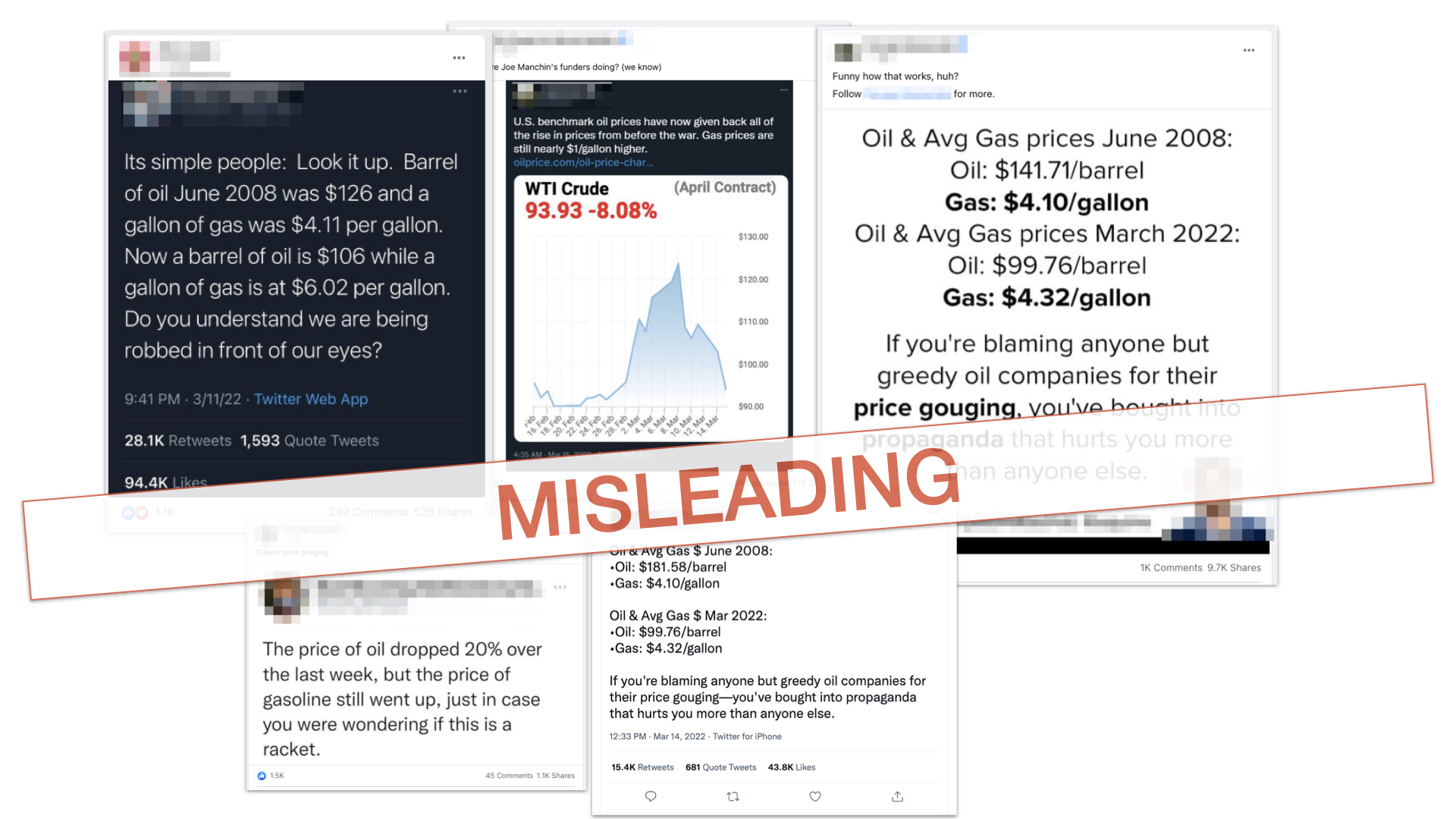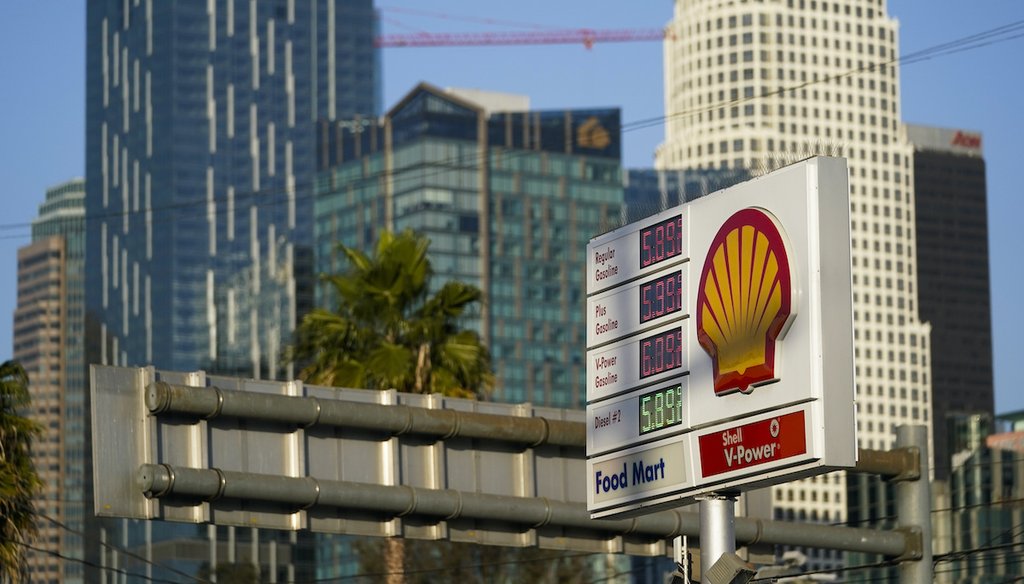

Our only agenda is to publish the truth so you can be an informed participant in democracy.
We need your help.


Gas prices are displayed at a gas station in downtown Los Angeles on March 9, 2022. (AP)
Experts who study the price of oil and gas said it can take weeks for gasoline prices to respond to changes in crude oil costs.
In 2008, an economic recession caused a supply shortage that drove up oil and gas prices.
Currently, Russia’s invasion of Ukraine, increased labor costs, the pandemic and additional taxes and inflation have all contributed to rising gasoline prices. The same factors weren’t at play in 2008, making direct comparisons misleading.
In early March, the price of oil shot up rapidly in response to Russia’s invasion of Ukraine and the United States’ decision to ban imports of Russian energy. Coupled with inflation, increased labor costs and other factors that had already raised the price of gasoline, drivers in the U.S. quickly saw much higher prices at the pump.
By March 14, the price of oil started to drop, but gasoline prices have been slow to follow, prompting some social media users to make comparisons to 2008 and accuse oil and gas companies of "price gouging." The term is generally used when businesses take advantage of rising demand during a crisis and charge exorbitant prices for necessities.
One Facebook post claimed that the price of oil was $141.71 per barrel in June 2008 while gas cost $4.10 per gallon on average. In March 2022, the post said oil cost $99.76 per barrel, while the average price of gas was $4.32 per gallon.
"If you’re blaming anyone but greedy oil companies for their price gouging, you’ve bought into propaganda that hurts you more than anyone else," the March 14 post said.
The post was flagged as part of Facebook’s efforts to combat false news and misinformation on its News Feed. (Read more about our partnership with Facebook.) Other posts similarly claimed that because oil prices fell and gas prices didn’t, companies must be exploiting consumers.

Posts with misleading claims about the relationship between the price of oil and the price of gasoline.
Experts who study the price of oil and gas told PolitiFact that it takes more time for gas prices to respond to changes in crude oil costs — and noted that there are factors in 2022 that weren’t at play in 2008, which make direct comparisons misleading.
The numbers are also cherry-picked, and the difference in pricing between 2008 and 2022 isn’t as large as the post suggests.
Crude oil prices are set in the global market. And the price of crude oil has the biggest impact on the price of gasoline — that’s been the case for nearly all changes in retail gasoline prices in the past 35 years, said Mark Finley, a fellow in energy and global oil at Rice University’s Baker Institute for Public Policy.
When Russia — the world’s third-largest oil producer — attacked Ukraine at the end of February, the uncertainty, fear of further conflict and international efforts to reduce reliance on Russian oil drove up crude oil prices.
High oil prices can quickly drive up prices at gas stations nationwide, experts said.
After oil prices fall, it typically takes a while for gas prices to decrease and consumers "often assume foul play" even when there isn’t any, said Nicole Petersen, a GasBuddy spokesperson.
Gas stations lose profit when oil prices increase sharply because they cannot drastically lift gas prices due to local competition, Petersen said. Then, when oil prices fall, gas stations try to recoup any losses before lowering their prices, she said.
Unique factors in each state’s gasoline market also affect gas prices, said Devin Gladden, a AAA spokesperson. Locally, gas stations might have contracts with gasoline dealers that lock in prices at a certain rate for set periods of time — sometimes weeks or months, he said.
The March 14 Facebook post correctly cited the average price of a gallon of gas that day: $4.32.
But it cherry-picked its $99.76 figure for the price of crude oil. West Texas Intermediate crude oil is traditionally used as a U.S. benchmark when discussing and comparing oil prices. On March 14, WTI crude oil hit a low of $99.76, but the closing price was $103.01.
Gas rose to $4.32 per gallon on March 14 as a result of oil prices being around $130 per barrel at times in the first half of March, Gladden said.
The Facebook post was wrong about prices in June 2008. The monthly average price of a gallon of gasoline was $4.05, and the average price of WTI crude oil was $133.88 per barrel, less than what the post claimed.
"The data set in this posting is misleading because it gives people this impression that crude prices are more stationary than they are," Gladden said. "In all actuality, they are highly volatile."
Posts comparing June 2008 prices to current prices also mislead because they compare a full month of data to half a month in 2022, experts said.
Different global conditions are also at play.
In 2008, the spike in oil and gas prices was tied to the financial crisis. The recession caused a drop in demand for gasoline, and as the economic recovery began, there was an "immediate ramp-up" in production to meet growing supply needs. That "supply crunch," caused prices to spike, Gladden said.
In March, the Russia-Ukraine conflict caused "panic and speculation" that contributed to the rapid price rises, Gladden said. But it’s also normal for prices to rise this time of year due to the demand from the spring and summer driving season, he said.
In part, that will "keep prices elevated even though oil prices have declined," Gladden said.
Also, an ongoing truck driver shortage, increased labor costs and high inflation in the U.S. have caused gas prices to rise. On top of that, Gladden said the oil industry is still recovering from the COVID-19 pandemic, which decreased gas prices due to decreased demand.
State-level taxes on gasoline are also about 7 cents higher per gallon now than they were in 2008, Finley said.
A Facebook post claimed that comparing the price of oil and gas in June 2008 to March 2022 shows that oil companies are "price gouging."
Experts said it takes time for gas prices to respond to drops in crude oil costs, and that’s not necessarily indicative of price gouging. The post’s numbers are cherry-picked; the difference in prices isn’t as great as it suggests.
The current situation differs from 2008 because increased labor costs, the pandemic, additional taxes and inflation were all already contributing to rising gasoline prices before Russia invaded Ukraine in February. Direct comparisons lack important context, experts said.
We rate these posts False.
RELATED: Ask PolitiFact: Why are gas prices going up?
RELATED: How much blame does Putin deserve for high gasoline prices?
Email interview with Nicole Petersen, a spokesperson for GasBuddy, March 15, 2022
Interview with Devin Gladden, a spokesperson for AAA, March 15, 2022
Email interview with Mark Finley, a fellow in energy and global oil at Rice University’s Baker Institue for Public Policy, March 15, 2022
Patrick De Haan tweet, March 15, 2022
CBS News, "Face the facts: A fact check on gas prices," March 21, 2012
CNN Money, "Oil touches record but ends lower," June 30, 2008
CBS News, "U.S. gas prices top $4 a gallon for first time since 2008," March 7, 2022
Reuters, "Oil price surges to highest since 2008 on delays in Iranian talks," March 6, 2022
Reuters, "CERAWEEK Energy conference returns to Houston as Ukraine conflict puts market in turmoil," March 7, 2022
USA Today, "Gas prices hover near record high pushing stocks to biggest loss in over a year," March 7, 2022
USA Today, "Gas prices are the most expensive in US history, breaking record from 2008," March 8, 2022
U.S. Energy Information Administration, "Gasoline and Diesel Fuel Update," March 7, 2022
CNBC, "U.S. oil tumbles more than 8%, dips below $100 per barrel," March 14, 2022
MarketWatch, "Crude Oil WTI," accessed March 16, 2022
MarketWatch, "Brent Crude Oil Continuous Contract," accessed March 16, 2022
U.S. Energy Information Administration, "Gasoline explained," accessed March 16, 2022
International Energy Agency, "Oil Market and Russian Supply," accessed March 16, 2022
U.S. Energy Information Administration, "Weekly U.S. All Grades All Formulations Retail Gasoline Prices," accessed March 16, 2022
U.S. Energy Information Administration, "Europe Brent Spot Price FOB (Dollars per Barrel)," accessed March 16, 2022
U.S. Energy Information Administration, "Cushing, OK WTI Spot Price FOB (Dollars per Barrel)," accessed March 16, 2022
U.S. Department of Transportation, "October 2021 Monthly Motor Fuel Reported by States," Feb. 17, 2022
U.S. Department of Transportation, "June 2008 Monthly Motor Fuel Reported by States," Oct. 28, 2008
U.S. Energy Information Administration, "U.S. Regular All Formulations Retail Gasoline Prices (Dollars per Gallon)," accessed March 17, 2022
In a world of wild talk and fake news, help us stand up for the facts.
